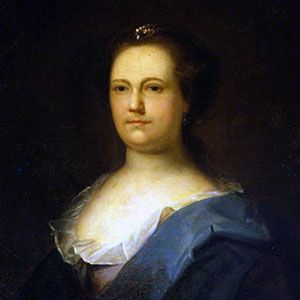Deborah Read was Benjamin Franklin’s common-law wife. By helping Franklin manage his numerous businesses, she allowed him to devote his time to political and scientific endeavors.
Early Life
Deborah Read was born in 1707, the seventh child of John and Sarah Read. It is unclear whether Deborah was born while her parents still lived in England, or after they moved to Philadelphia, Pennsylvania. Little is known about her childhood.
Marriage to Franklin
Deborah met Benjamin Franklin shortly after he moved to Philadelphia, Pennsylvania in 1723. He later became a boarder in her house. Franklin eventually courted Deborah, and the couple had even discussed marriage. However, Franklin failed to keep in touch with her while traveling to London to establish himself in the printing business.
In 1725, Deborah’s mother convinced her to marry John Rogers, a local potter. The relationship ended after Deborah discovered Rodgers had a wife in England. Rogers allegedly fled to the West Indies to avoid debtors.
Upon returning from England, Franklin rekindled his relationship with Deborah and proposed marriage. However, Deborah refused, worrying that they could be charged with bigamy if Rodgers returned. On September 1, 1730, the couple entered into a common law marriage, agreeing to live together as husband and wife without formal approval by religious or civil authorities.
While Franklin ran his printing business, Sarah managed his other business interests, as well as the family home. Franklin and Deborah had two children together. Francis Folger (“Franky”) who died of smallpox at the age of four and Sarah (“Sally”). They couple also raised Franklin’s illegitimate son William.
Later Years
Deborah’s fear of overseas travel kept her away from her husband for long periods of time, although they did regularly correspond by letter. Beginning in 1768, Read suffered a series of strokes, which left her in poor health and suffering from depression. Franklin was aware of his wife’s condition, but he remained in Europe.
Deborah suffered a fatal stroke on December 19, 1774 in Philadelphia, while Franklin was in England. When Franklin returned from England three months later, he wrote to a friend about the death of his wife: “I have lately lost my old and faithful Companion; and I every day become more sensible of the greatness of that Loss; which cannot now be repaired.”








